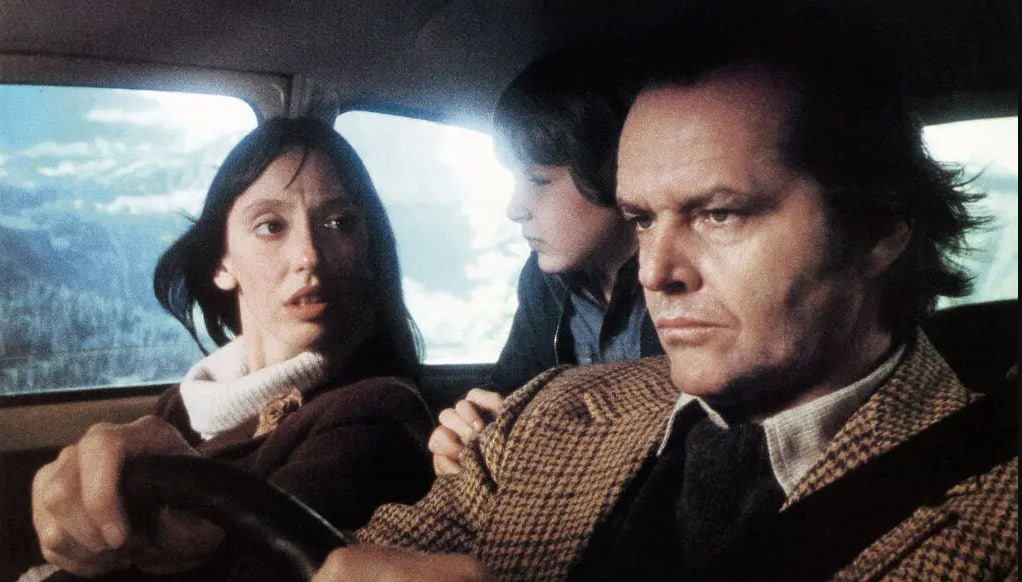In Stanley Kubrick’s chilling 1980 adaptation of Stephen King’s novel ‘The Shining’, Shelley Duvall delivers a captivating performance as Wendy Torrance, the wife of the slowly unraveling Jack Torrance (played by Jack Nicholson). Duvall’s Wendy is the quintessential Gothic heroine – vulnerable yet resilient, terrified yet determined to protect her son Danny (Danny Lloyd) at all costs.
From the beginning, Duvall establishes Wendy as a complex and nuanced character. She is loving and supportive of her troubled husband, but also increasingly uneasy about his disturbing behavior and the dark forces at work in the Overlook Hotel. Duvall masterfully conveys Wendy’s gradual transition from a concerned wife to a woman in sheer terror for her life.
The famous “Here’s Johnny!” scene, where Jack Nicholson’s Jack Torrance smashes through the bathroom door with an ax, is a tour-de-force for Duvall. Her wide-eyed horror, panicked screams, and desperate attempts to fend off her husband’s attack are utterly convincing. Yet, despite her character’s overwhelming fear, Duvall also infuses Wendy with an unexpected resilience and determination.
As the film progresses, we see Wendy’s courage grow as she fights to survive and save Danny. In the climactic chase through the Overlook’s snowy hedge maze, Duvall’s Wendy summons every ounce of her strength to outwit her deranged husband. The final image of Wendy, bloodied but unbowed, gazing defiantly at the camera, is a powerful testament to the character’s indomitable spirit.
Duvall’s nuanced, emotionally charged performance is a large part of what makes ‘The Shining’ such an enduring horror classic. Wendy Torrance stands as one of the great Gothic heroines of cinema – a woman who, despite her initial fragility, discovers an inner fortitude that allows her to triumph over the unspeakable evil that has invaded her life. Shelley Duvall’s masterful portrayal ensures that Wendy will be remembered as a true horror icon.
Stanley Kubrick’s adaptation of Stephen King’s “The Shining” has carved out a legendary status in the annals of horror cinema. Among its many remarkable elements is Shelley Duvall’s portrayal of Wendy Torrance, a character who epitomizes the Gothic heroine in a uniquely modern context. Duvall’s performance, often overshadowed by the film’s chilling atmosphere and Jack Nicholson’s iconic turn as Jack Torrance, deserves a closer look for its depth, nuance, and the sheer strength it embodies.
The Gothic Heroine Reimagined
Traditionally, Gothic heroines are characterized by their vulnerability, emotional intensity, and a sense of entrapment within a decaying, haunted environment. Wendy Torrance fits this mold but brings an added layer of resilience and resourcefulness that elevates her beyond the archetype.
Duvall’s Wendy is introduced as a soft-spoken, nurturing figure, seemingly fragile amidst the vast, oppressive spaces of the Overlook Hotel. Her wide eyes and tentative mannerisms paint her as an innocent, almost ethereal presence in a setting dripping with malevolence. Yet, as the narrative progresses, Duvall imbues Wendy with a quiet yet formidable strength that becomes the film’s emotional anchor.
Endurance and Strength Under Pressure
One of the most compelling aspects of Duvall’s performance is how she portrays Wendy’s gradual transformation from a passive wife and mother to a determined survivor. The infamous “Here’s Johnny!” scene, where Jack wields an axe and attempts to break into the bathroom where Wendy and their son, Danny, are hiding, showcases this metamorphosis vividly. Duvall’s terror is palpable, but so is her determination to protect her child at all costs.
Duvall’s ability to convey such a range of emotions—fear, desperation, resolve—adds a profound depth to Wendy’s character. Her physical and emotional exhaustion becomes a conduit through which the audience experiences the relentless psychological and supernatural torment of the Overlook. This raw, visceral portrayal was not without personal cost to Duvall, whose grueling experience on set is well-documented. Yet, it’s this very ordeal that lends authenticity to her performance, making Wendy’s strength all the more believable and impactful.
The Power of Maternal Instinct
A significant aspect of Wendy’s strength lies in her role as a mother. Her fierce protection of Danny provides the driving force for her actions throughout the film. Unlike many Gothic heroines who often succumb to their circumstances, Wendy’s maternal instincts empower her to fight back against the horrors that threaten her family. This maternal dimension adds a layer of universality to her character, resonating deeply with viewers who can relate to the primal urge to safeguard one’s loved ones.
Duvall’s portrayal ensures that Wendy’s courage is not born from heroism in the traditional sense but from a profound, instinctual place of love and duty. This nuanced performance challenges the audience’s expectations of passive femininity in horror, presenting instead a heroine whose strength is both quiet and formidable.
A Lasting Legacy
In retrospect, Shelley Duvall’s performance in “The Shining” stands as a testament to her incredible talent and resilience. Wendy Torrance remains a character of significant depth and complexity, a Gothic heroine who embodies vulnerability and strength in equal measure. Duvall’s portrayal transcends the horror genre, offering a rich study in character resilience that continues to inspire and resonate.
Shelley Duvall’s Wendy Torrance is more than just a scream queen or a damsel in distress; she is a beacon of quiet strength and enduring will. In a film dominated by the looming specter of madness and malevolence, it is Duvall’s portrayal of Wendy that provides a glimmer of hope and humanity, firmly establishing her as a perfect Gothic heroine with a deep well of strength.






